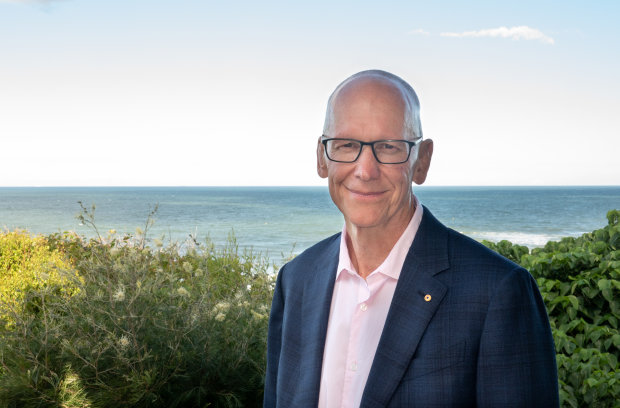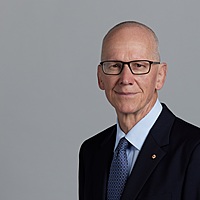Geoff Wilson's 5-coin system for teaching kids about investing

Livewire Markets
When the founder of Wilson Asset Management Geoff Wilson's daughter was about nine years old she took out an envelope, put $1.40 inside and told her dad she would like to buy one share in WAM Capital. Nearly 20 years later, he still has that envelope tucked away in his office.
It was a swift sentiment before Wilson mentally worked out the returns and dividends over that time.
"WAM Capital, which is our largest LIC, I remember it was trading at $1.40 … Well, I mean, now they're trading at $2.20. So over that period of time, she would've received dividends and she got a good return," he said.
At one point or another, many investors have an epiphany that they want to invest for their children's future and pass on some of that knowledge they've built up over their careers. Not to mention, it's terribly easy to lose money in markets if you've never properly learned how to invest.
Teaching kids how to invest can be as important as teaching them how to save. Kids have an amazing capacity to learn new things - whether it starts as simply as that first share or leads to a professionally managed portfolio.
So with that in mind, we wanted to speak with leading investment managers about how they invested for their kids, and in time, how they taught their kids to invest for themselves.
The first investor we spoke to for this series was Geoff Wilson AO, founder and CIO of Wilson Asset Management and avid crusader for Listed Investment Companies (LICs) as a vehicle for investment.

Image: Geoff Wilson AO, Founder & Chairman, Wilson Asset Management. Source: Supplied.
What's so great about Warren Buffett?
In a world now where investment opportunities are seemingly created from thin air, and all the headlines in the media are about growth stocks and hyperactive social media investors: it's a fair question. What is so great about the Oracle of Omaha?
This is one question Wilson remembers his daughter asking him when he was heading over to his first Berkshire Hathaway AGM.
Wilson said there are two investing greats he has taken his own lessons from, particularly after the stock market crash in the 1980s. He refers to Warren Buffett, from whom he learned the wisdom of compounding and the importance of investing in quality businesses.
"If you take the Warren Buffett philosophy, he's saying the business is the more important thing, with the moat around it. I agree with that," he said.
"But it really depends what your time horizon is. If your time horizon is 20 to 30 years and if you're young then that is incredibly important.
Management is the second most important thing to look at. Recognising good management can be tough, but Wilson believes that it gives investors a headstart on growth.
"Eventually, the right management will turn up. I like to get a bit of a headstart, so I'd prefer to have the right management there, managing the business. So to me, backing management is very important, but that's probably a more second-order way of looking at companies", he said.
The other great teacher for him has been Sir John Templeton the founding father of mutual funds, "one of the doyens of investing" as Wilson called him. The key takeaway for Wilson in the late 80s was to make sure you're putting 10% of your income aside to invest in the equity market.
And no wonder this has paid off. Australia has seen three straight decades of economic growth since the early 1990s. But even if the economic engine is chugging along, you need to be savvy to capitalise on that growth.
Teaching good investment habits
Wilson has been investing for over 40 years and while he has picked up many lessons along the way, but some of the best lessons for your kids are the essentials.
#1 Set up good habits from the start
For Wilson, it was never too early to start. He began by giving his daughter pocket money and setting it up as a "five-coin" system.
The idea is to give your child five coins:
- one coin for spending,
- one coin for saving,
- one coin for giving to charity,
- one coin for investing, and
- one is for your child to choose.
Not only is it setting up a good structure for your kids, but it gives them a bit of leeway and empowerment through that final coin. It's the ultimate marshmallow test: do you want to buy one marshmallow now? Or compound your investment and buy the whole packet later?
You can also see Wilson's philanthropic bent has been instilled in the family and his peers by way of the establishment of the Wilson Foundation, and also the creation of the Future Generation Fund - a philanthropic fund consisting of two LICs: Future Generation Australia with approximately $580 million AUM and Future Generation Global with approximately $674 million AUM.
#2 Understand what you're investing in
In this lesson, Wilson follows Peter Lynch's "invest in what you know" strategy, and it means as an investor you should have an appreciation for a share as part ownership of a business.
"If that business does well, you do well. If the business does poorly, you do poorly. So it's really understanding that you are buying a share of a company," said Wilson.
It's a mentality shift from speculating or predicting the future, but instead understanding the fundamentals of a business and why you're buying into it.
Wilson believes that everyone has a competitive advantage they just need to work to that advantage. This advantage comes from knowing a business well - either as an expert in a field or even as a loyal customer.
#3 What's old is new again
Investing in "what you know" doesn't preclude you from investing in new or innovative companies. Take Afterpay.
Wilson was surprisingly optimistic about Afterpay. Like many in Wilson's generation Afterpay is akin to layby and so creates a nexus of innovation and a recognisable growth strategy.
"When I grew up, my mum would go and layby things and I was thinking, ah, isn't it very similar to layby? ... But the good thing (about Afterpay) is the younger people I've worked with were big supporters," said Wilson.
But, be wary of the pace of change, Wilson said.
"Will Apple be around? Will Google be around? Will they still grow and prosper in 50 or 60 years? It's tricky. It's difficult because before Google when I used to look up something, I'd look at Yahoo, and then on the phones, it was Nokia. Where's Nokia?" he said.
Don't try peering too far into the crystal ball - you do so at your own peril.
So where do you begin?
Wilson is the absolute champion of LICs. But are LICs really for early-stage investors aka your kids?
"With a Listed Investment Company, you're assessing: what are the value of the assets? Are they cheap? Am I buying a dollar for 80 cents? Or am I paying a $1.20 for a dollar? So there's a level of skill, which is obviously greater than the ETF, and you're getting a diversified portfolio," he said.
But investors can start more simply with an index fund or an ETF. The problem with these methods is that you'll always be tracking the market and you'll always "paying a dollar for a dollar", said Wilson.
"An index fund or an ETF, to me, that's the more basic way of getting exposure to a market. And then the next level up - if you want to see if someone can create some value above what the market will achieve - then you either look at an active ETF, or you look at a Listed Investment Company, which gives you a portfolio of shares that are professionally managed by a fund manager," he said.
But, said Wilson, LICs are incomparable for getting that supercharged return by taking advantage of discounts. It's incredibly tricky to navigate, but there lies the fun.
"One of the things I love about Listed Investment Companies versus the ETF or the index fund is you can use a little bit more skill," he said.
So, perhaps once your kids have mastered the market and want the next challenge, LICs will be waiting.
Never miss an insight
We want to hear from our readers, fundies, wealth managers and anyone who has tried to teach investing to kids. Send us your tips and stories either in the comments or via the Contact button below.
Enjoy this wire? Hit the ‘like’ button to let us know. Stay up to date with my content by hitting the ‘follow’ button below and you’ll be notified every time I post a wire. Not already a Livewire member? Sign up today to get free access to investment ideas and strategies from Australia’s leading investors.
10 stocks mentioned
2 contributors mentioned

Mia Kwok is a former content editor at Livewire Markets. Mia has extensive experience in media and communications for business, financial services and policy. Mia has written for and edited several business and finance publications, such as...

